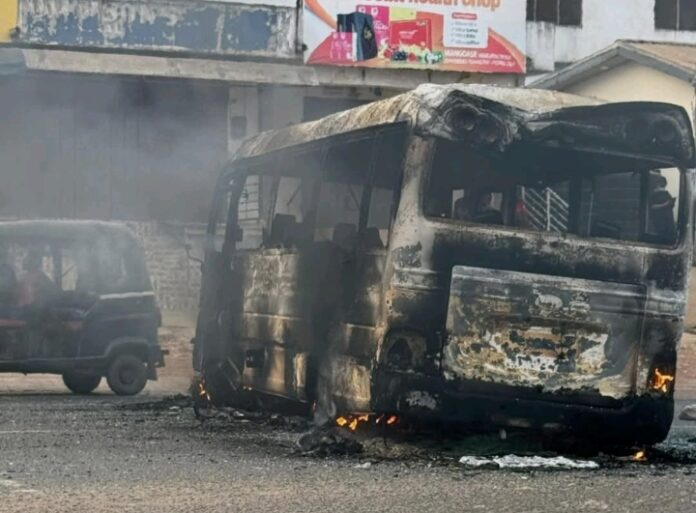A violent confrontation between soldiers and illegal miners at the AngloGold Ashanti mining site in the Ashanti region of Ghana has left at least seven dead and several others injured, sparking widespread unrest and protests in the nearby town of Obuasi. The clash, which occurred on January 20, 2025, has set off a chain of events that has heightened tensions in the region, where accusations of exploitation and economic hardship have long simmered beneath the surface.
According to a statement from the Ghana Armed Forces, around 60 illegal miners armed with a variety of weapons, including pump-action guns and locally made rifles, attempted to breach the premises of the AngloGold Ashanti mine. When intercepted by military personnel guarding the site, the miners reportedly opened fire, prompting the soldiers to return fire in self-defense. The result was a deadly exchange that led to several fatalities and left the area in turmoil.
A military spokesperson confirmed that seven individuals had died during the confrontation, but a local representative for the miners disputed this account, claiming that the miners were unarmed and simply trying to gain access to the site in search of work. The Ghana Armed Forces have insisted that their response was justified, emphasizing that they had a duty to protect both the property of AngloGold Ashanti and the surrounding community.
Protests Erupt in Obuasi
In the aftermath of the deadly clash, violent protests broke out in Obuasi, with enraged residents venting their fury at the mining company. At least three vehicles were set ablaze, and several buses were also torched during the unrest. The protests reflect deep-rooted frustrations in the community, where many locals feel that the mining company has been profiting from the land without contributing enough to the local economy or improving conditions for residents.
A local miner, speaking under the condition of anonymity, stated, “We have been oppressed by these mining companies for years. They take everything and give nothing back to us. It’s no surprise that things turned violent.”
In response to the violence, Ghana’s President John Mahama called for an immediate investigation into the incident. The presidency confirmed that the number of dead had risen to eight, despite earlier reports citing only seven fatalities. “We will ensure that those responsible for this tragedy are brought to justice,” President Mahama said in a statement, adding that the government would take necessary steps to prevent further escalation.
The government has also directed AngloGold Ashanti to cover the medical costs for the injured and pay for the funeral expenses of those who lost their lives in the conflict. In the face of these developments, security forces have been deployed to the area to restore order and prevent further violence.
A Growing Crisis of Unregulated Mining
The violent clash at the AngloGold Ashanti site is the latest flashpoint in an ongoing crisis that has been brewing in Ghana for years. The country’s economic struggles, exacerbated by inflation, public debt, and high unemployment, have led to a boom in small-scale mining—much of it illegal and unregulated. The rise of unlicensed miners, known locally as “Galamsey” miners, has posed a significant challenge for both the government and legal mining companies.
Many illegal miners, desperate for employment and income, have turned to unlicensed operations, which often involve dangerous working conditions and severe environmental damage. Environmental groups have warned that the activities of these miners are contributing to deforestation, water pollution, and land degradation.
Kofi Adams, the chairman of the Ghana National Association of Small-Scale Miners, called the violence at the AngloGold Ashanti mine “unprecedented.” Speaking to Reuters, he expressed confusion over the scale of the confrontation, noting that in previous incidents, warning shots had been used to disperse miners without resorting to deadly force. Adams also confirmed that, in his view, the escalating situation was a direct result of the strained relationship between the miners and the companies operating in the region.
“We have to ask ourselves why this violence continues. It’s not just about the miners. It’s about the frustration of our people who feel excluded from the wealth that these mining companies are extracting from our land,” Adams said.
Tensions With AngloGold Ashanti
The ongoing unrest has also highlighted long-standing tensions between AngloGold Ashanti and local residents. Despite the company’s claims of contributing to community development, including building infrastructure and providing employment, many Obuasi residents accuse the company of failing to live up to its promises.
“AngloGold has been here for years, yet we see no real change in our lives,” said Kwaku Owusu, a local resident. “They take the gold, but we don’t get the jobs or opportunities they promised. This is why the youth are angry and willing to take matters into their own hands.”
In a statement issued after the violence, AngloGold Ashanti stressed that the safety and wellbeing of its employees and the community were its top priorities. A spokesperson confirmed that the company was cooperating with the authorities in the ongoing investigation and would take all necessary steps to ensure that justice was served.
Ghana’s Economic Crisis and the Rise of Illegal Mining
The roots of the violence go deeper than just the clash at the mining site. Ghana, once known for its stability and growing economy, is facing an economic crisis. High inflation, public debt, and rising unemployment have left many Ghanaians struggling to make ends meet. This economic hardship has fueled the rise of illegal mining, as young people in rural areas turn to the mines in search of quick income.
The government’s efforts to regulate the sector have had limited success, and the illegal mining industry continues to operate with relative impunity in many parts of the country. Critics argue that the government has failed to provide alternative livelihoods for those involved in illegal mining, leaving them with few options but to risk life and limb.

